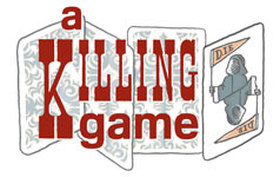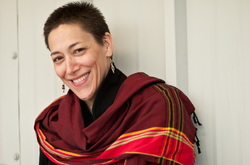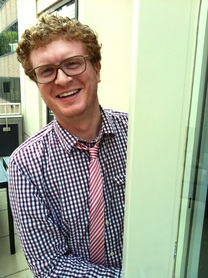 Barack Obama is president. Wisconsin's Tammy Baldwin is the first openly gay person elected to Senate. Maryland and Maine approve Same-Sex Marriage. Missouri's Todd Akin and Indiana's Richard E. Mourdock, both of whom made heinous comments about rape and abortion, are out! All is right with world ... well, almost. As human beings and citizens, we can't only be charitable at Christmas. We can't only be appreciative at Thanksgiving. We can't only be civic-minded on Election Day. "The role of citizens in our Democracy does not end with your vote. America's never been about what can be done for us. It's about what can be done by us together through the hard and frustrating, but necessary work of self-government. That's the principle we were founded on." ~~ President Barack Obama dog and pony dc exemplifies this day-to-day call to action in their work. They're an ensemble of artists who come together to devise theatrical performances. Their work is stimulating, original, and relevant. As audience members, we're not only considered, we're encouraged to participate, to think, and to make choices. And I dare say, we're all the better for it on the other side! From November 8 – November 11, 2012, Arena Stage's Cradle Series will feature performances from dog & pony dc's A Killing Game in rep with banished? Productions' Into the Dollhouse. It's going to be a great weekend of theatre! Have you bought your tickets yet? Here's more about dog & pony dc's A Killing Game and my interview with collaborators Rachel Grossman, Jessica Lefkow, and J. Argyl Plath: About the Play In a not-so-distant time, in a city strikingly similar to this one, a deadly plague begins killing the citizenry—inexplicably, indiscriminately, and fast! What’s going on? Who will die next? Can the disease be contained? Where can you turn? Only you—your cunning and skills—can keep you alive ‘til the end of the show. Do you have what it takes to survive? We can't all die, can we?  RACHEL GROSSMAN is DC-based performing artist, administrator, and producer. She is the co-founder and Ring Leader for dog & pony dc. Rachel has produced all 7 of dog & pony dc's shows, directed COURAGE and Beertown, and performed in Cymbeline, Bare Breasted Women Sword Fighting, Separated at Birth, and Beertown. Rachel spent two years at Woolly Mammoth Theatre Company launching their “connectivity” innovation and serving as the first connectivity director. Prior to that she was the director of education & outreach at Round House Theatre, and managed education and community programming at Shakespeare Theatre Company, Arena Stage, and Centerstage. Rachel was one of fifty professionals featured in TCG’s I AM THEATRE video campaign. Jacqueline Lawton: If you only had three words to describe dog and pony dc, what would they be? Rachel Grossman: Inquisitive Mustachioed Clowns JL: What is your role in dog and pony dc? Rachel Grossman: I am one of three founders of d&pdc--with Lorraine Ressegger-Slone and Wyckham Avery--and am currently one of two Ring Leaders (with Lorraine). We refer to ourselves as an "ensemble-based" company because it has always been important that we operate as collectively as possible in both the artistic and administrative areas. Some ensemble companies work more at the consensus end of the collaboration continuum. We vacillate up and down that continuum but tend to find ourselves most often (and work best) on the consensus side of democracy. JL: What inspired you to create A Killing Game? Rachel Grossman: As with most of our shows, the inspiration was really a confluence of ideas, sources, and people over time. Director Colin K. BIlls had been interested the Ionseco play, JEU DE MASSACRE (translated: KILLING GAME) and had me read it for a whole other project about 5 years ago. It kept popping into my enough over the years that I shared it with Wyckham and Lorraine. Then one day in 2011 on my way to BEERTOWN rehearsal I was listening to the Radiolab episode "War of the Worlds" and the descriptions of the mass hysteria that resulted from Welles' broadcast entered into this fascinating conversation with Ionesco's play in my brain. At the same time, there were all these reports coming out of Egypt about people tweeting and retweeting "first hand accounts" of the riots that were anything but, making it impossible to tell fact from opinion to interpretation to fiction. These three sources, when combined with the ensemble's personal experiences living in this time of hyperbolic media and in a city of bombarded with alerts and warnings, built the foundation for A KILLING GAME. JL: Why should audiences come see A Killing Game? Rachel Grossman: To have fun? Seems like a huge reduction, but A KILLING GAME is designed to transform a night at the theatre--going to see a play--into a party game. d&pdc is becoming known for creating entertaining, unexpected shows that provide audiences new perspectives into the possibilities of life theatre. So if you're a theatre enthusiast -- you should come. If you don't tend to care for theatre as you've seen it in the past -- you should come. Either way, come open to the play. JL: Why was it important for the production of A Killing Game to be a part of Arena Stage’s Cradle Series? How has this experience benefited the growth and development of the piece? Rachel Grossman: d&pdc's work is guided by the principle of "audience integration" - the intentional focus in the development and performance of theatre on the audiences' role in the production / live experience. We believe the audience completes our ensemble, at some point making it impossible to move forward with the development of a show without bringing "audience" into the rehearsal room. With this show in particular we've host a number of "testing sessions" along the way but they tend to be with 6 - 12 people. It was integral in the final weeks of devising the show, before its premiere at Capitol Hill Arts Workshop on November 28, that we test with a larger group of people... and ones that were not necessarily hip to the inner-workings of the show. When the invitation came from Arena Stage to participate in the Cradle Series, it seemed the stars were aligned. We don't yet know how the piece will benefit specifically, but we have set up a schedule of showing material in order to maximize our learning and growth from night to night. So if someone comes to the Cradle on Thursday, Friday, or Saturday night, and then returns for the only full-run we'll do there on Sunday they might see significant adjustments made to the material based on their participation and feedback from just a few days prior. We want audiences to take ownership in A KILLING GAME's development--you truly complete our ensemble.  JESSICA LEFKOW is a director and performer based in DC. With dog & pony dc she has appeared in Courage, Beertown, and A Killing Game, and served as a clown director for Separated at Birth. Jessica directed the World Premiere of the Helen Hayes Award-winning Honey Brown Eyes (2009 Best New Play, Theater J). Other Washington-area directing credits: Hercules In Russia; TETHER, (Doorway Arts Ensemble); Red Herring, Mousetrap (1st Stage); Dear Sara Jane, (The Hub Theater); House of Blue Leaves, (Montgomery College, Rockville); BENCHED (independently produced). Jessica has appeared in Bootleg Shakespeare and Riot Grrrl productions with Taffety Punk Theatre Company. She appeared as Eunice in A Streetcar Named Desire, (Gulfshore Playhouse) and as Queen Margaret in Richard III, (Brave Spirits Theatre Company). Jessica is a Teaching Artist with Young Playwrights Theater and Washington Area coordinator for the Gary Austin Workshops. She’s a working mom and a proud member of AFTRA. Jacqueline Lawton: If you only had three words to describe dog and pony dc, what would they be? Jessica Lefkow: Original. Entertaining. Thought-provoking. JL: What is your role in dog and pony dc? Jessica Lefkow: Conspirator, (Company Member). In A Killing Game, I devise & perform. JL: What inspired you to create A Killing Game? Jessica Lefkow: Conspirator Colin K. Bills emerged over the course of making BEERTOWN as someone who we all thought it would be fun to have in a directing role for a piece. He'd long been intrigued by Ionesco's 'The Killing Game', and the ideas/hypothesis just sort of flowed from there. Working as an ensemble allows our discussions to have a long life, with ideas for projects floating up over time. The moment to dive into this exploration arrived, and we were off! JL: Why should audiences come see A Killing Game? Jessica Lefkow: Have you ever wondered about how you might respond during a deadly emergency? Are you interested in a theater experience that's inclusive & compelling at the same time? Are you ready to be part of a game in which everybody wins, (or loses…) with laughter along the way? Do you want to influence how d&pdc plays this game? Then this show is for you. JL: Why was it important for the production of A Killing Game to be a part of Arena Stage’s Cradle Series? How has this experience benefited the growth and development of the piece? Jessica Lefkow: Our performances have come to lean so heavily towards partnership with everyone in the room as to be impossible to fully rehearse/gauge for effectiveness without an audience. The Cradle Series offers us an opportunity to bring people in to play with us, an opportunity commensurate with the wide net cast by Arena Stage. The Series comes altogether felicitously at an ideal moment in the rehearsal/development of this new piece for our Nov-Dec 2012 run. I write before the Arena run, but I know from experience that the opportunity to workshop our pieces in performance conditions never fails to yield specific and concrete lessons for us as we work towards the *best* possible embodiment of the work. Audiences are just that smart.  J. ARGYL PLATH is the Director of Interactive for a PR/Creative firm in downtown Washington, DC. With dog & pony dc he has participated in the development and performance of A Killing Game, Beertown, Separated at Birth, and Courage. In addition he is the Creator and Managing Director of an established literary magazine. He is proficient in a variety of musical instruments including voice. He is a writer and artisan needle-worker. He has been a member of a variety of creative groups that have generated everything from original printed works to plays and musicals. He has taught High School. He is teaching himself 日本語. He appreciates Bridge and other parlor games. He prefers cheese. His bio typically reads: "J. Argyl Plath grew up watching the Golden Girls and Designing Women." He is telling the truth about that. Jacqueline Lawton: If you only had three words to describe dog and pony dc, what would they be?
J. Argyl Plath: No fourth wall. JL: What is your role in dog and pony dc? J. Argyl Plath: Conspirator. That means I'm a company member. I tend to be extensively involved in the writing/shaping process and then have some smaller role in the actual productions. JL: What inspired you to create A Killing Game? J. Argyl Plath: I remember the moment it was pitched to me. It has grown/evolved a lot since then but I remember being told that we wanted to explore fear and mass hysteria and I instantly had all these ideas of how to elicit visceral reactions from the audience. Then I read the Ionesco play of an indefinite articleless same name and was further inspired by its political/social commentary through absurdism. JL: Why should audiences come see A Killing Game? J. Argyl Plath: Because are so many things I could do with their $5-40. But seriously: we've tried to create a show that is unique to each performance and that has many distinct elements that ensure it will be different each night (most of which are completely up to the audience). All the while maintaining that sense of safety and opt-in inclusiveness that I hope we are beginning to be known for. JL: Why was it important for the production of A Killing Game to be a part of Arena Stage’s Cradle Series? How has this experience benefited the growth and development of the piece? J. Argyl Plath: We need blood in the room. By that I mean: we need people to interact with. Virtually the entire show rests on our interactions with and the decisions of the audience. We've done small experiments with a handful of invited friends, but this will be our first opportunity to really get some realistic feedback on a lot of the show's elements. And then we'll use the last two weeks before we open to make adjustments. But let's be honest, we'll keep tweaking and adjusting the show throughout the run. That's just what we do. We're perfectionists who are never satisfied with the phrase "this is the best this will ever get." These shows at Arena are giving us the opportunity to start that process of endless improvements even earlier.
0 Comments
Your comment will be posted after it is approved.
Leave a Reply. |
My BlogI'm a playwright, dramaturg, and teaching artist. It is here where you'll find my queries and musings on life, theater and the world. My posts advocate for diversity, inclusion, and equity in the American Theatre and updates on my own work. Please enjoy!
Categories
All
Archives
June 2020
Reading List
|
